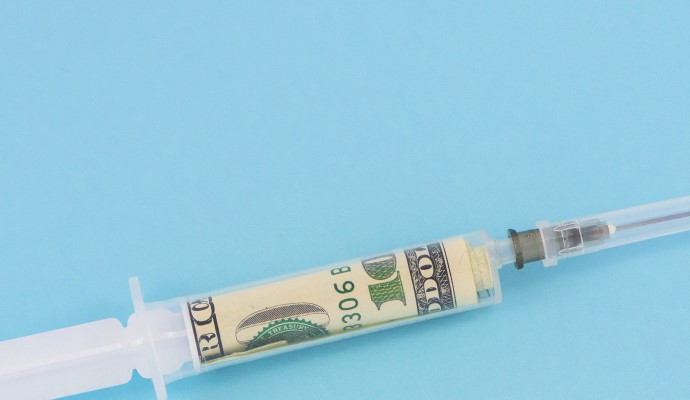More Patients Cite Out-of-Pocket Costs as Care Access Barrier
The number of patients saying out-of-pocket healthcare costs are a care access barrier is the highest it’s been since the start of the COVID-19 pandemic.

Source: Getty Images
- Three in 10 Americans are citing high out-of-pocket patient costs as a care access barrier, with those patients telling a West Health and Gallup poll that they skipped necessary medical care in the past three months because of financial challenges.
The survey of over 6,500 respondents, obtained via email, showed out-of-pocket healthcare costs are a problem even for the richest people. Among those households making more than $120,000 annually, 20 percent said they did not access healthcare in the past three months due to high costs.
These figures represent a peak for the nation. The overall rate of cost-related delayed care is the highest it’s been since the start of the COVID-19 pandemic. For the richest households, the rate of cost-related delayed care is 3 percent higher than it was between March and October of 2021.
“Americans have reached their breaking point,” said Shelley Lyford, president and CEO of West Health, said in a public statement. “Between March and October, the percentage of people reporting trouble paying for healthcare, skipping treatments and not filling their prescriptions spiked to their highest levels since the pandemic began, exacerbating another public health threat borne out of cost rather than illness.”
Just under two-thirds (59 percent) of respondents said they are increasingly worried about the cost of overall healthcare services, and 45 percent said they’re increasingly worried about the cost of their prescription drugs. A third of respondents said the high cost of healthcare contributes to some of the stress of their daily lives, while 15 percent said it contributes a lot to that stress.
READ MORE: Patient Out-of-Pocket Healthcare Costs Balloon by 10% Since 2020
The survey could also estimate that 12.7 million people—equal to about one in 20 adults—know a friend or family member who died this year because they could not access cost-prohibitive healthcare treatment. This trend was more prevalent among Black people, who were twice as likely to know someone who died from delaying costly medical care.
This comes as more people hold an unfavorable view of the healthcare industry than when COVID-19 began. The survey estimated that 100 million people would describe the nation’s healthcare system as “broken” or “expensive, and 48 percent said their view of healthcare is worse due to the pandemic.
Those negative opinions, although certainly fueled by healthcare affordability and out-of-pocket patient cost problems, go beyond the price tag. Sixty percent of respondents said they’re increasingly concerned about healthcare inequities; that concern is held by 75 percent of Black people and over two-thirds of Hispanic people.
“This negative public sentiment did not form overnight or begin with COVID-19. It’s been decades in the making after failed promises by elected officials to do something to help Americans suffering at the hand of high prices for healthcare and prescription drugs,” Tim Lash, chief strategy officer for West Health, said in the survey’s press release. “However, public opinion plays an important role in the policy process, and if policymakers are listening, they have no choice but to act.”
But patients aren’t optimistic that’s going to happen. Over two-thirds of respondents across any political party said they don’t think federal policies that reduce healthcare costs will come to fruition. Nine in 10 respondents said they anticipate their healthcare costs to increase this year, while 42 percent said they’re afraid they won’t be able to pay for healthcare in 2022.
“The sharp worsening in public opinion regarding the affordability of care and medicine is startling, and likely a result of myriad factors related directly and indirectly to the COVID-19 pandemic,” Dan Witters, a senior researcher for Gallup, said in the press release. “From rapidly rising inflation, to deferred care pushed into 2021, to more people having to pay for COVID-19 care itself, the U.S. healthcare cost crisis is now coming to a head.”
This West Health and Gallup survey adds to the growing literature indicating that out-of-pocket healthcare costs are increasingly burdensome for patients.
In December, the Robert Wood Johnson Foundation and Urban Institute found that 13 million US adults skip filling their prescriptions because of affordability issues. That includes 2.3 million Medicare beneficiaries and 3.8 million privately insured working-age adults who skipped necessary treatments due to high healthcare and drug costs.
Other data corroborate that overall healthcare costs are soaring for patients. In August 2021, Kalorama Information reported that out-of-pocket patient costs were up 10 percent since the year previous with the net total of patient financial responsibility coming in around $491 billion in 2021.
What’s more, the report showed that by 2026, Americans may see an increase in out-of-pocket costs of 9.9 percent, amounting to some $800 billion in patient spending.
As noted in the West Health and Gallup survey, patients are becoming fed up with these issues and simply not engaging with their medical care. Healthcare policymakers looking to ensure patients practice medication adherence, stick to preventive screening schedules, and access care as soon as they experience issues, may consider actions that mitigate patient cost burden.
